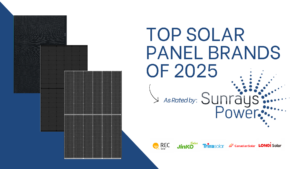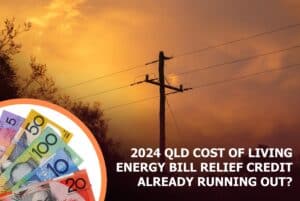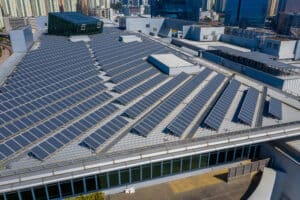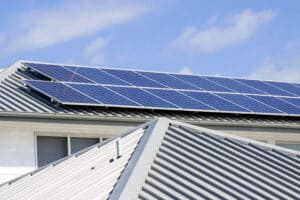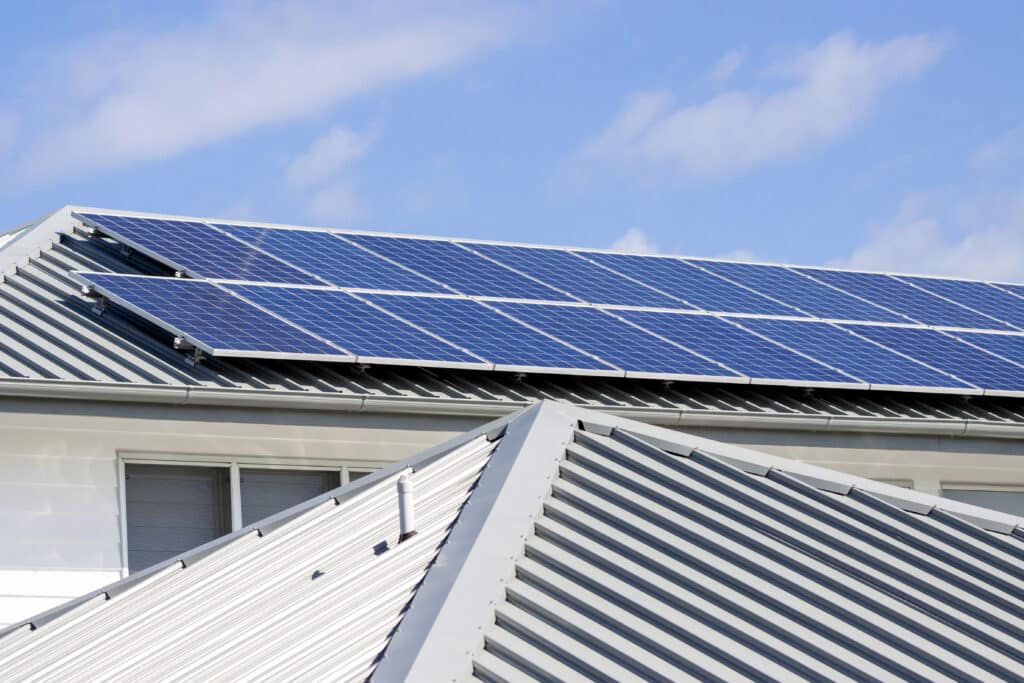
We understand that researching Solar is overwhelming, and it is difficult to know where to start, and when you do start, it seems like a straightforward task, requiring just durable solar panels, inverters, and reliable installers. However, it turns out to be more complex than expected. Wondering why? The confusion arises from two main issues in the Australian solar industry. On one hand, there are solar cowboys running solar sales companies that offer incredibly low prices for their products but provide poor-quality materials that cannot be trusted.
On the other hand, some retailers claim to sell premium-quality products, but charge excessively high prices, making solar beyond our reach. So, the question is, how do you find the right balance between cost and quality? That’s why we made this list of four solar tips to help you. It includes important things to watch out for and think about, so you can go in the right direction and make the solar journey easier.
1. Deciding on Your Ideal Solar Retailer Experience
When embarking on your solar system journey, the first and most crucial step is to select the right solar retailer—not the products, at least not at this stage. The retailer you choose plays a pivotal role in ensuring a smooth and successful solar installation.
Teamwork Makes the Dream Work
Having a good team is essential for realising your solar dreams. You need a trustworthy team that can handle any unexpected issues or changes during and after the installation. They should keep you informed, respond to your messages promptly, and proactively address any problems that may come up. Unfortunately, finding the right team might take some time, especially if you’re just exploring options. But, given time and how they treat you as a person and not just another customer, you’ll know if they’re the ones for you. Additionally, different solar retailers and installers vary in their expertise and the services they offer. Some may offer additional fancy add-ons, while others focus solely on system installation.
Sales Promises, Retailer's Ability to Deliver, and Avoiding Solar Cowboys
Solar retailers and installers vary in their expertise and services. Some are more skilled and offer a wide range of services, while others focus mainly on installing the solar system. Regardless of their claims, their ability to upkeep their promises can be hard to identify.
In Australia, there are unfortunately many dishonest people in the solar industry who run failed solar businesses and use deceitful methods. They are so common that they are referred to as “Solar Cowboys.” These solar cowboys, when caught, simply close their business and then open a new one a few months later. This not only damages the reputation of the entire Australian solar industry but also puts their previous customers at risk.
When solar companies go out of business or suddenly close, their former customers become “solar orphans.” This means that if you have installed a solar system through them, and the system needs repairs or replacement parts during the warranty period, you will be on your own. It’s unfortunate, but if another installer tries to “fix” your solar installation, it may void the warranty.
Furthermore, if there are any parts that need replacement under warranty, the new installer won’t be able to request them for you, leaving you solely responsible for ordering and shipping the replacements yourself.
You can spot a solar cowboy by looking at their company’s Australian Business Number (ABN). If the ABN is very new or has lots of businesses linked to it, it might be a sign of a risky company.
But remember, not all new ABNs mean the company is unreliable! We recommend that you exercise caution here and ask questions about their past solar history and check their reviews, pictures, videos, and accreditations as proof of quality and credibility.

Established companies like Sunrays Power can provide evidence of their credibility through proven track records, including case studies, reviews, and publicly available portfolios and certification certificates. We have years of experience in the Australian solar industry, and we are committed to transparency and accountability. We encourage you to thoroughly evaluate the legitimacy and trustworthiness of any company you consider for your solar installation.
Finding Proof of Credibility: Pictures, Videos, Past Customer Reviews and Accreditations
Do They Have Previous Solar Installation Pictures?
To make an informed decision, take your time to research. Firstly, start by examining the installer’s portfolio, which typically includes pictures of their previous work. Pay close attention to the diversity and complexity of their past projects, as this can give you an idea of their expertise and capabilities. By doing so, you can get a visual representation of the quality and style of their installations.
Do They Have Installation Videos on Their Website or YouTube?
Some companies might have a YouTube channel or videos on their website where they show their previous installations. Watching these videos can give you a good idea of the quality of their past work. By seeing how well they’ve done installations in the past, you can better judge if they are the right company for your needs.
Do They Have Previous Customer Reviews and Testimonials
Another warning sign to watch out for is the quality of the reviews. When you’re checking out solar companies, reading reviews written by past customers can give you important information about how good their service is and how satisfied their customers are. Reviews that are detailed and thorough are usually from happy customers who had a positive experience. By paying attention to these reviews, you can get a clearer picture of a company’s reputation and how reliable they are.
On the other hand, if you come across quick and simple reviews with short sentences, it might indicate that the company is using questionable tactics to convince their clients to leave fake positive 5-star reviews. Reading customer reviews becomes an essential step in evaluating a company’s trustworthiness and the level of service they provide. Together, these actions ensure that you choose a reliable solar company that will be there for you in the long run, offering ongoing support and delivering on their promises.
Solar Accreditations
Starting July 2023, the Australian Competition and Consumer Commission will no longer endorse the old CEC Approved Solar Retailer/CEC Installer accreditations. Instead, consumers should look for businesses which have signed a voluntary agreement under the New Energy Tech Consumer Code (NETCC). NETCC was co-written by the CEC and six other Clean Energy Bodies in Australia and is endorsed by the ACCC.
Currently New Energy Tech Approved Seller certification is one of the best ways to ensure that you are purchasing a solar system from a company that respects their customer’s protections and rights. Unaccredited retailers may be blacklisted, or currently lack expertise in installing solar PV systems. These companies frequently undercut the installation prices of other solar retailers to draw customers to them instead.
Additionally, in Australia, batteries must meet additional electrical compliances to protect your health, home, and solar system. Each battery model requires a special approach and specialised knowledge to install, because manufacturers have different needs that must be met to extend the lifespan of your battery. Because of this, most electricians are not qualified to install solar batteries. Be cautious of companies that offer to add a battery to your solar system but fail to provide the necessary certification for installing the offered battery!
Asking Questions
Don’t hesitate to ask the solar retailer or installer any questions you may have. A good retailer or installer will be ecstatic to answer your questions! This step is vital for clarifying any doubts or concerns you might be harbouring. By seeking clarification now, you can gain a better understanding of their approach, materials used, and the overall process they follow.
2. Choosing Your Solar Panels and Inverters
Once you’ve chosen your solar retailer, the subsequent step involves selecting the appropriate brands of solar panels and inverters for installation on your residential or commercial property. However, it’s important to note that solar panels and inverters differ from other appliances like air conditioners or TVs. While you can endure temporary periods without the latter, solar panels resemble cars in their significance – a malfunction translates to financial loss every passing day.
The Australian Context
If we were to look for a good solar panel or inverter, our preference leans towards solar brands that consistently deliver on their pledges of superior efficiency and durability. However, we strongly advise considering solar panel and inverter brands that have proven their mettle within the Australian setting. It might surprise some people that while solar panels are designed to sit out and absorb the sun, they are very susceptible to heat, this is the same for inverters, too much heat, rain, strong wind or hail can damage your solar system to the point that it stops working.
Furthermore, solar companies with a significant presence in Australia are better equipped to address any potential issues that may arise later on. Brands that maintain an Australian branch tend to respond more promptly to warranty requests, and offer quicker shipping for replacement parts, should the need to repair a system arise. It’s important to keep in mind that every day the solar system is non-operational results in financial losses. Which is why it is so important to select a solar brand with an Australian office and local capabilities.
Choosing The Right Solar Panels
When it comes to solar panels, it’s crucial to go for high-quality ones that can withstand corrosion and handle high temperatures. This ensures your solar system will keep working smoothly for around ten years with minimal fuss. Cheaper solar panels have failed in the Australian climate as early as 24 months. Water infiltration, corrosion, hotspots, malfunctioning bypass diodes, and flawed junction boxes are all frequent culprits behind panel malfunctions that render them completely useless. This becomes more of a problem when you choose an installer or retailer who then does a poor job of installing them onto your roof.
Another aspect to think about is how your chosen panels will be positioned on your roof. Depending on your roof’s design and structure, it might be worth investing a little more to get slimmer or more efficient panels that fit your roof’s shape better. This not only maintains a pleasing appearance but also lessens wind drag, and load bearing on your roof. A good solar retailer will help you find the ideal solar panels for your roof’s shape and your home’s energy requirements. They will also consider the local weather conditions and shading concerns of your chosen installation area.
Choosing The Right Inverter
Looking into inverters, your selection of an inverter could be the most crucial aspect of your solar system. Regardless of the system you have in place, the inverter emerges as the component most likely to encounter issues, though such instances are exceptionally infrequent. Inverters of lesser quality often falter under Australian conditions, typically ceasing to function within the initial 24 months due to heat, water ingress, or subpar installation practices.
When deciding on an inverter, it’s wise to opt for a brand that maintains a presence in Australia. Look for qualities like quiet operation, efficiency, and advanced features such as Wi-Fi monitoring. Additionally, seek out smart safety controls like an arc fault circuit interrupter and resistance to corrosion. For an inverter that truly distinguishes itself, we suggest choosing one designed to accommodate varying string sizes. Such inverters can handle high string currents, which is crucial for the latest, more efficient panels. Furthermore, in cases where the string size is very small, these inverters can operate with a low start-up voltage.
Mounting, Wiring and Switches
When you’re getting a system installed, it’s a good idea to have a chat with your installer about the quality of the materials they’ll be using to mount things, the wiring they’ll be using, and the switches that will be part of the setup. It might not be something people often talk about, but these behind-the-scenes components are really important. These components are where most of the cost cutting happens when you go with a solar company that sells systems for cheap. Think of it like a chain – if one link is weak, the whole chain can break. So, these less-discussed parts are just as crucial in making sure your system works well and lasts a long time.
3. Choosing The Right System Size
Choosing the correct size for your solar power system depends on a range of factors. It’s not a one-size-fits-all situation, even if a reputable installer sets it up. Going with a generic system won’t give you the results you’re looking for, and you might find your electricity bill remains unchanged. This boils down to your solar retailer or installer and how they tailor the system to fit your needs.
To determine the best system size for you, a skilled solar installation team will not only inquire about your lifestyle but also:
-
-
- Examine your energy usage during off-peak and peak times.
- Evaluate the condition of your roof and measure the usable rooftop area (Usable refers to: no shading, no south-facing roof, no significant roof penetrations like vents and air conditioning ducts, antennas, satellite dishes).
- Understand your electricity consumption patterns by discussing your household appliances and their usage habits.
- Explore and educate you in energy-saving strategies to reduce peak energy use, like timing the operation of your pool pump, electric water heater, dishwasher, washing machine, dryer, and air conditioner.
- Determine if your home has a single-phase or three-phase electrical system.
- Create a breakdown of your energy usage based on your average electricity bill.
- A good solar retailer should also consider your future energy needs, such as the potential addition of an electric vehicle, battery storage, or new appliances like central air conditioning.
-
These factors collectively influence the ideal size of your solar system. Conversely, decreasing your energy consumption can also influence the necessary system size. At Sunrays Power, we can assist you in evaluating your energy requirements and designing a solar system that suits your specific needs. Our experts will collaborate closely with you to make sure the system aligns with your current and future energy objectives.
How Sunrays Power Can Help You Install Your Dream System
We at Sunrays Power want to help you positively contribute towards the environment, and in doing so, save you money by installing sustainable systems that last. We assure you that our team will carefully offer you only the best quality systems made using trusted brands and quality parts, all tailored to your site, your needs, and your future energy expectations.
We will step you through the entire process from the very first consultation, and we will still be there, ready to help even after the installation. Our team works hard so you can have complete satisfaction from the very start to the very end.
If you want to do more research into the specifics of solar, and how Sunrays Power can help, we have created a comprehensive solar guide that provides valuable information to help you navigate the solar landscape. This solar guide covers important topics such as the return on investment and shading loss, which can impact the performance of your solar system, as well as each component of a solar system. By familiarising yourself with these aspects, you’ll be better equipped to make decisions that align with your goals and ensure the effectiveness of your investment.


